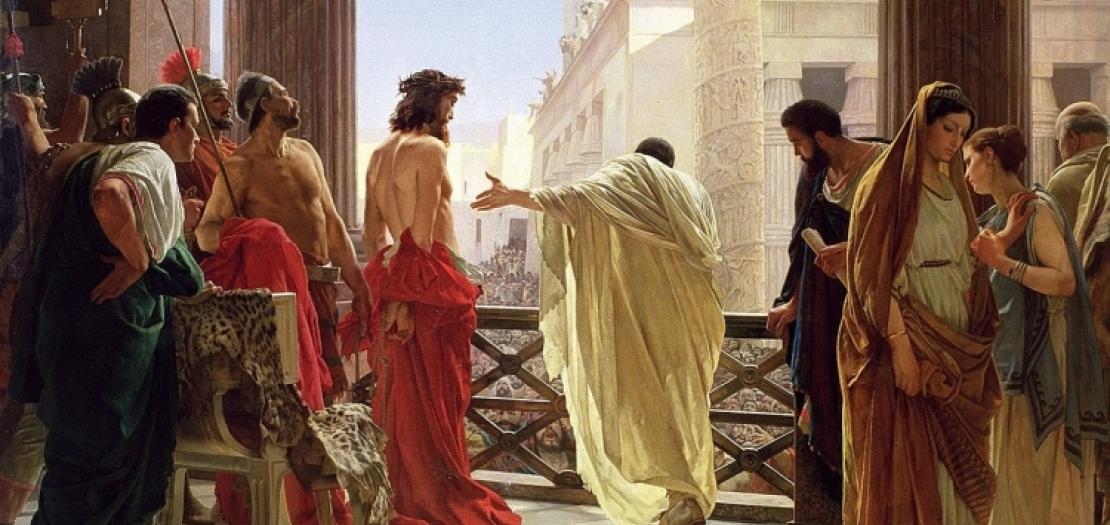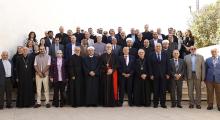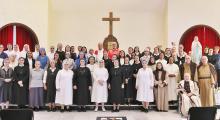Issued by the Catholic Center for Studies and Media - Jordan. Editor-in-chief Fr. Rif'at Bader - موقع أبونا abouna.org

Following is the text of meditation by Cardinal Pierbattista Pizzaballa, Latin Patriarch of Jerusalem, marking the solemnity of Christ, King of the universe, dated November 24, 2024:
The book of Exodus is permeated by a question that will accompany biblical Israel throughout the history of revelation: Who is the true king? The one who feeds me but oppresses me and takes away my freedom, like Pharaoh in Egypt, or the one who liberates and saves me, like the Lord God?
This question about the king in our lives, about the king we want, is basically a question we all have to ask ourselves.
Although the various liturgical celebrations focus precisely on the liberation from Pharaoh, biblical Israel often forgets its liberation from Egypt in the course of history: it forgets that God alone is its king, that God alone is the only liberator. And therefore, it will want its own king, like the king of all other nations.
That is, it succumbs to the temptation to have a strong and powerful man at its head, a brave man who can guarantee it wealth and security, who can feed it, as Pharaoh did.
But history will show that this temptation often turns out to be an illusion: with a few exceptions, these kings will not be able to offer the people what they expect from them. On the contrary, history tends to show the opposite: kings who are called to care for the people like shepherds for their flock, often turn into mercenaries as soon as they come to power, pursuing their own interests, unable to guarantee peace and security, unable to care for the poor and needy, unable to solve the many injustices among their people.
Hence the expectation of another king: would the time ever come when a king would truly care for his people?
The Gospel of John also asks this question, and in the passage we read today, (John 18:33-37) Pilate is asked this very question: “Are you the king of the Jews?” (John 18:33)
The context is that of the trial that will lead to Jesus' death sentence.
Pilate only knows one model of kingship; he only knows the strong and powerful kingship of the Roman emperor.
He does not know that there can also be another kingship.
And now he has before him a man who proclaims himself king, but seems to be everything but a king.
Kings kill and usurp, Jesus allows himself to be captured and crucified.
Kings have splendid robes, Jesus will be robbed of his own robes.
Kings judge, Jesus is judged.
A king who does not wear the symbols of power, wealth and dominion.
But Jesus does not even sound like an evildoer, a revolutionary, someone to be afraid of.
So, who is this man who is handed over to him to be hung on the cross precisely because he called himself king? (John 18:35)
Jesus does not seem to be very interested in the subject of kingship and answers Pilate with a counter-question, which makes it clear that the accusation of having proclaimed himself king comes less from Pilate than from the priests and the leaders of the people (“Do you ask this on your own accord, or did others tell you about me?” (John 18:34) Pilate is therefore also called upon to ask the fundamental question of who the king of life is.
Jesus seems to be interested more in the question of truth, i.e. the meaning of his own mission: why did he come into the world? (“You say that I am a king. For this I was born, and for this I came into the world, to testify to the truth.” (John 18:37)
Not to establish an earthly kingdom: His kingdom is not of this world or from this world. (John 18:36) If it were of this world, he would advocate its logic, its ends and its means (“If my kingdom were from this world, my followers would be fighting to keep me from being handed over.” (John 18:36)
Instead, the kingdom of God is different, and one of the most significant differences is that it does not coincide with a single people and has no borders to defend or extend. Therefore, Jesus can say that everyone who lives in the truth belongs to this kingdom, i.e. everyone who lives the life of children, of those who trust the Father and expect life from him: “Everyone who belongs to the truth listens to my voice.” (John 18:37)
Jesus came to proclaim this truth, and everyone who listens to him and acknowledges him belongs to this kingdom.
A kingdom that therefore excludes no one: Everyone can belong, as long as they are able, to keep alive the question of which king they follow and which truth they choose.
+ Pierbattista







